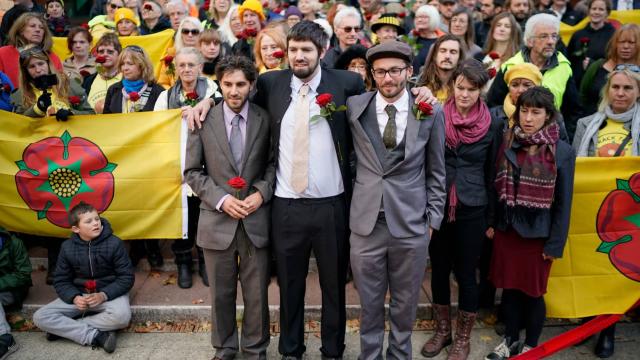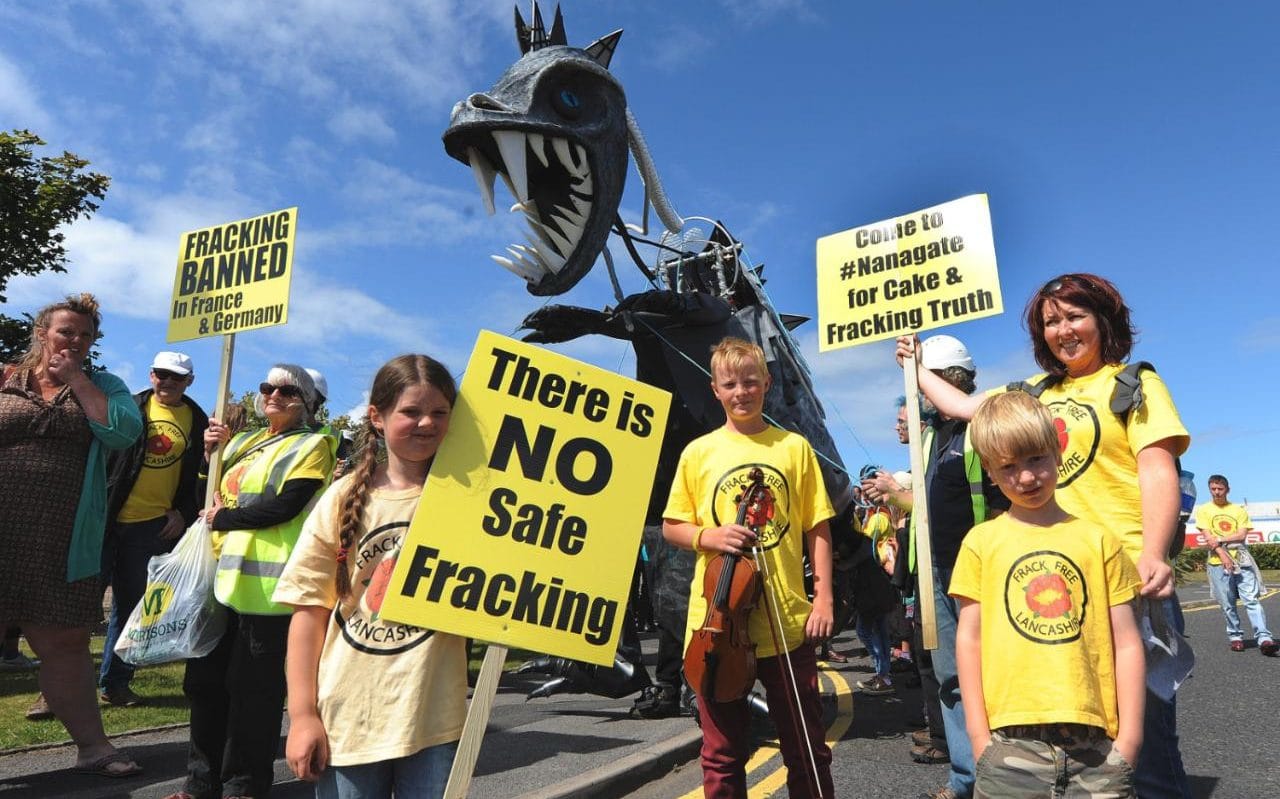
Anti-fracking protesters (from left ) Richard Loizou, Richard Roberts and Simon Roscoe Blevins with supporters outside Preston crown court.Photograph: Christopher Furlong/Getty Images
Four UK protesters went to court last week to contest what may be Britain's most draconian sentences handed down for peaceful environmental protest since 1932.
Widely referred to as the “Frack Free Four,” all four men were initially convicted, with three – Simon Blevins, Richard Roberts and Richard Loizou – sentenced to prison stays of up to 16 months for non-violently obstructing the transfer of fracking materials to a fracking site in Lancashire.
On Wednesday, their sentences were overturned. Just days afterward, four earthquakes hit Blackpool fracking sites with minor earthquakes also detected on the Lancashire fracking site.
Roberts, one of the Frack Free Four, told Occupy.com after the verdict:
“Since 1932, no environmental campaigner has been imprisoned in the UK as a direct result of an action. They’ve always been imprisoned for breaching bail conditions, failing to pay court fines or something of that nature.”
Roberts said the judicial U-turn on their convictions may spur a broader rethink over treatment of protesters.
“I think the appeal set a very good precedent. Many of us thought that dark times were upon us with the repression of protest and the rise of the far right. But then we had the Lord Chief Justice confirm that protesters should not be put in prison – confirm that despite us holding up a convoy containing part of a drilling rig and blocking half of an A-road for four days, we shouldn’t be in prison and that at most we should have a community service order,” he said.
Andrea Brock, one of three people responsible for initiating an open letter from academics in defense of the Frack Free Four, said in an interview with Occupy.com:
“I think as academics – many of us who research resource conflicts, ecological and social justice, and the violence and disastrous impacts of fossil fuel extractivism – we have a responsibility to speak out against such injustices. We are very happy about the Court of Appeal's decision to overturn the excessive sentencing of Blevins, Roberts and Loizou.
"In the last few weeks, people across the UK – including over 1,500 academic signers of the open letter – have spoken out in shock and disbelief," she added. Now, as a result, "the anti-fracking movement showed that it was not intimidated by the ruling, with people continuing to take action, not least [last] Monday, when Cuadrilla started its fracking operations in Lancashire and activists blockaded their site for 12 hours."
"We need more, not less direct action to challenge the government's support of the fracking industry. Even though today's result is a victory, we must be not be complacent. We must be vigilant and continue to resist the suppression of resistance and the criminalization of protest in the UK.”
Leigh Coghill, a prominent anti-fracking campaigner who last year quit her job on Yorkshire Council to focus full-time on the issue, told Occupy.com: “It’s been over seven years since the last frack. We were convinced that the original decision was very flawed, so that gave us the confidence to put this before the judge.”
Coghill is still concerned, however, that not enough progress has been made putting the fracker versus anti-fracker fight on a level playing field with the law.
“They’re making it harder for local authorities to say no to fracking,” she said. “When they do say no, their cases are often overturned in Westminster. Potentially legitimate protest is being quashed on a large scale.”
Not only that, but opposition from locals who are simply too afraid to publicly protest against fracking is being ignored.
“Too much of the dialogue is focused on the protesters and not the wider communities affected by actions such as fracking,” Coghill added. “I don’t think caring about the water in your area is particularly radical. Later on, another generation is going to have to deal with the fallout from all this.”
As one of the protesters freed by last week's decision, Roberts wasn't shy in issuing an emphatic call to action to his fellow anti-frackers.
“When it comes to taking peaceful direct action against fracking, such as getting in the way of or climbing on lorries, in different countries it can be a different kettle of fish. I know that in cases such as that of Standing Rock in the USA, the police were a lot more violent, so I can’t speak for every country. But where it’s possible it’s a really empowering thing to do. Even if you aren’t taking direct action, there will be something you can do behind the scenes," he said.
“There’s a lot of PR from the gas industry that gas is a good transitional fuel between coal and renewables, because it’s cleaner than coal. The mistake they’re making is assuming that gas demand and gas consumption will remain the same for decades to come. Even with no resistance, the shale gas industry is looking to be at peak production in the 2020s and 2030s, going on into the 2060s. This is far too late to introduce a new fuel system.”
















